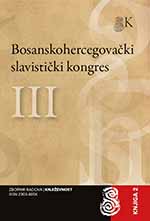Emocijski identitet i koronavirus – novi književni lik na primjeru suvremene hrvatske drame U sobi nešto široj od kože (2020) I. Sajko
Emotional identity and Coronavirus – A new Literary Character on the Example of contemporary Croatian drama In a room slightly wider than skin (2020) I. Sajko
Author(s): Jelena Alfirević FranićSubject(s): Language and Literature Studies, Studies of Literature, Croatian Literature, Health and medicine and law
Published by: Slavistički komitet BiH
Keywords: emotional identity; coronavirus – a new literary figure; depression; Ivana Sajko; emotionology; blind spot; narcissistic identity; emotional disability; emotional function; emotional code; COVID-19;
Summary/Abstract: The notions of subject and identity are of key interest in various branches of contemporary literary theory, but also in other disciplines (Peternai Andrić 2015). However, in the closed fortress of academic hermeticism, the discourse on identity is ruled by a “true terminological haze”, so the notion of identity is not only widely used, but also massively abused (Nenadić 2020). Due to the need to concretize the term “identity” (Petković 2020), and as a contribution to the interdisciplinary development of literary science, the paper will define the newly conceived literary theory term emotional identity, which is a blind spot in literary science. The representation of emotional identity will be explored on the example of the contemporary Croatian psychological drama In a Room Slightly Wider Than Skin (2020) by Ivana Sajko. Its specific classification will be determined with regard to the prevailing emotion (fear) of the contemporary dramatic protagonist, which becomes a feature of her literary emotional (depressive) identity, and which is encouraged in the drama by the world’s anti-pandemic (self) isolation and social atmosphere of alienation due to the virus. The literary-theoretical notion of emotional identity will be defined according to the anti-essentialist understanding of identity. In doing so, the psychoanalytic and medical concept will be taken over, which corresponds to the fact of emotional/affective turn in literary science, when many authors of studies on emotions take into account knowledge from non-native disciplines (Oatley, Jenkins 2003; Robinson 2005; Barrett, Lewis, Haviland-Jones 1993). Emotionally depressed literary identity will be correlated with narcissistic identity, and the term emotional disability or identity equal to disability (Alfirević 2021) will be presented in this context. The “emotional label” of the literary narrative and the “literary emotional function”, newly conceived literary theoretical concepts aimed at, together with the theory of emotional identity and emotional code, methodologically connect traditional (post-)structural-ism (semiotics) and modern emotionalism, which has never been the case before way of reading/approach in the research of literary and artistic text in scientific methodological practice, neither in world nor in domestic science of literature. This paper seeks to contribute to the poststructuralist research paradigm of literary identities, as well as to emotionalism as a literary science in development (Peternai Andrić 2020), which is insufficiently researched. The depressive (post) covidal atmosphere influenced the narrative structuring of the coronavirus as a new literary character, and the paper presents/ proposed the phenomenon of corona-literature (hence this corona-drama) as a contemporary literary paradigm.
Journal: Bosanskohercegovački slavistički kongres
- Issue Year: III/2022
- Issue No: 2
- Page Range: 97-130
- Page Count: 34
- Language: Croatian

